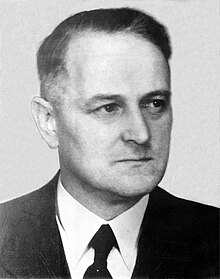Friedrich Breitbach
Friedrich Breitbach (born June 23, 1897 in Nickenich ; † November 5, 1991 in Trier ) was a German businessman, sparkling wine manufacturer and Lord Mayor of Trier from 1945 to 1946 .
Life
Breitbach was the seventh of eleven children of master blacksmith and farmer Carl Breitbach (* May 13, 1859 - January 1, 1935) and his wife Anna Breitbach, née. Windheuser (born October 30, 1859 - February 2, 1939) was born in Nickenich near Andernach. His family was influenced by Roman Catholics .
After elementary school, Breitbach completed an apprenticeship as an industrial clerk. From 1915 to 1918 he did front service in France and Russia, where he fell ill with malaria. After his recovery he worked as a banker. In 1925 he switched to the wine industry, which from then on shaped his professional work. In 1935 he took over the management of the then renowned winery Katholischer Bürgerverein in Trier, which was renamed Trier Bürgerverein 1864 AG a year later.
During the war until its end - despite eviction orders and the bombing of the city - Breitbach stayed in Trier. Four days after the Americans had captured Trier on the night of March 1 to March 2, 1945, the Trier military commander, Lieutenant Colonel Speaks, appointed Friedrich Breitbach as the new mayor. Although the latter pointed out that he was not an administrator, Speaks stuck with his nomination; He said that some Trier would have to take on this task, since the return of thousands of Trier was to be expected soon. In order to protect Breitbach from the werewolf announced by Goebbels , he was always accompanied during the day by two American soldiers, who also slept in Breitbach's apartment at night. Breitbach started with nothing.
With energy and high personal commitment, at the same time under constant suspicion of the occupation, Breitbach organized the rebuilding of the administration and tried to do justice to the hardship and the problems of the returning population. The procurement of food and housing for the starving population were the most important and difficult tasks. As early as March 10, 1945, the beginnings of a new city administration with Breitbach's staff from the citizens' association and its office equipment were evident. As a symbol of a new beginning and hope, Breitbach arranged the re-erection of the market cross on June 29, 1945, the feast day of the patron saint, St. Peter . When the French army took over the occupation on July 10, 1945, they left Breitbach in his position. On September 15, 1946, the first democratic local election after the Nazi dictatorship took place, in which a city council was elected, which in turn had to elect an honorary mayor in place of the full-time mayor. The choice fell on the businessman Heinrich Kemper . Breitbach handed over his office to him on September 25, 1946.
After his resignation as Lord Mayor, Breitbach was able to turn back to the management of the Trier Citizens' Association. In 1951 he was one of the initiators of the establishment of the Faber sparkling wine cellar, which began producing sparkling wine in 1953 as Saar-Sektkellerei Faber KG. As their general partner, he largely determined their fortunes until 1975.
From 1947 to 1952 Breitbach was Vice President of Industrie- u. Chamber of Commerce Trier. From 1964 to 1970 he was the chairman of the board of trustees for the "reconstruction of the Steipe ".
Honors
Breitbach received several honors: Awarded the Freiherr vom Stein plaque from the state of Rhineland-Palatinate (1954), the Federal Cross of Merit 1st Class (March 1964) and the seal of honor from the city of Trier (June 1965). The city of Trier commemorates him with “Friedrich-Breitbach-Straße”.
literature
- The man from the very beginning, post-war mayor, died at the age of 94 ; in Trierischer Volksfreund No. 258 of November 7, 1991, p. 8
- Emil Zenz : Friedrich Breitbach 90 years old ; in: New Trierisches Jahrbuch . Trier 1987, p. 37 f.
- Emil Zenz : Friedrich Breitbach † ; in: New Trierisches Jahrbuch . Trier 1992, p. 216 f.
- Emil Zenz : The communal reorganization of Trier after the city was occupied by the Americans. The Breitbach era ; in: Kurtrierisches Jahrbuch . Trier 1978, pp. 137-166
- Emil Zenz : The city of Trier in the 20th century, 1st half 1900–1950 . Spee-Verlag, Trier 1981, pp. 411-436, ISBN 3-87760-608-3 .
- Klaus Breitbach, Trier City Library (ed.): The Friedrich Breitbach era ; in: Publications from the Trier City Archives . Volume 1. ISBN 978-3-00-047357-9 . Trier 2014
- Klaus Breitbach: Review of the post-war documentary "The Friedrich Breitbach Era" ; in: New Trierisches Jahrbuch . Trier 2015, pp. 157–177
- Rudolf M. Gall (author): Breitbach, Friedrich , In: Heinz Monz (ed.): Trier biographical lexicon , Trier Wissenschaftlicher Verlag 2000, ISBN 3-88476-400-4 , p. 51 f.
Web links
- Entry on Friedrich Breitbach in the Rhineland-Palatinate personal database
Individual evidence
- ^ Emil Zenz : In the difficult post-war period at the head of the city , in Trierischer Volksfreund No. 141 of June 23, 1987
- ↑ Rudolf M. Gall, in: Monz, Heinz (Ed.): Trier Biographical Lexicon . - Trier: Wissenschaftlicher Verlag, 2000. - ISBN 3-88476-400-4 , pp. 51-52
- ↑ honor seal of the city of Trier
| personal data | |
|---|---|
| SURNAME | Breitbach, Friedrich |
| BRIEF DESCRIPTION | German merchant, sparkling wine manufacturer and Lord Mayor of Trier (1945–1946) |
| DATE OF BIRTH | June 23, 1897 |
| PLACE OF BIRTH | Nod |
| DATE OF DEATH | 5th November 1991 |
| Place of death | trier |

